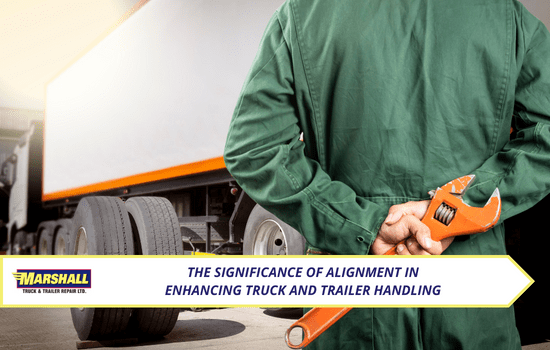Beyond mere maintenance, alignment is a fundamental aspect of truck and trailer safety and performance. By prioritizing regular alignment checks and adjustments, drivers pave the way for improved handling, stability, and overall safe and efficient operation.
The Key Role of Alignment in Truck and Trailer Safety
 When it comes to trucks and trailers, maintaining proper alignment might not be the first thing that comes to mind, but it plays a critical role in ensuring safe and efficient operation on the road. Proper alignment contributes significantly to better vehicle handling and stability, which are essential factors for both the safety of the driver and the cargo being transported. In this blog, we'll explore how alignment affects trucks and trailers and why it's essential for a smooth and secure ride.
When it comes to trucks and trailers, maintaining proper alignment might not be the first thing that comes to mind, but it plays a critical role in ensuring safe and efficient operation on the road. Proper alignment contributes significantly to better vehicle handling and stability, which are essential factors for both the safety of the driver and the cargo being transported. In this blog, we'll explore how alignment affects trucks and trailers and why it's essential for a smooth and secure ride.
1. Enhanced Steering Control
Proper alignment ensures that the wheels of your truck or trailer are precisely positioned as they should be. When wheels are correctly aligned, steering becomes more responsive and precise. This means that the driver can easily control the vehicle's direction, even in challenging road conditions or when carrying heavy loads. Enhanced steering control is critical for maneuvering safely through tight spots and avoiding obstacles.
2. Improved Tire Life
Misalignment can cause uneven tire wear, which reduces the lifespan of your tires and increases the likelihood of a blowout or tire failure. When tires wear unevenly, it's not just a matter of cost; it can also compromise vehicle stability and safety. By maintaining proper alignment, you ensure that your tires wear evenly, extending their lifespan and reducing the risk of sudden tire-related incidents.
3. Better Fuel Efficiency
A properly aligned truck or trailer experiences less rolling resistance, which means that the engine doesn't have to work as hard to propel the vehicle forward. This translates into improved fuel efficiency, reducing operational costs and environmental impact. With rising fuel prices, every improvement in fuel efficiency is a welcome benefit for trucking companies and owner-operators.
4. Enhanced Handling and Stability
Alignment is crucial for maintaining stability, especially when navigating curves, turns, or abrupt maneuvers. A vehicle with misaligned wheels can exhibit unpredictable handling behaviour, making it harder for the driver to maintain control. Proper alignment ensures that the truck or trailer handles predictably and responds as expected, reducing the risk of accidents.
5. Cargo Safety
For trucks and trailers carrying valuable or sensitive cargo, alignment is vital. Sudden jolts, swaying, or unpredictable handling due to misalignment can damage or compromise the integrity of the cargo. Proper alignment contributes to a smoother, more stable ride, reducing the risk of cargo damage and ensuring that it arrives at its destination intact.
6. Reduced Maintenance Costs
Proactive alignment maintenance can help identify and address issues before they become more severe and costly to repair. Regular alignment checks can catch problems early, preventing excessive tire wear, suspension damage, and steering component wear. In the long run, this reduces maintenance costs and extends the lifespan of critical vehicle components.
